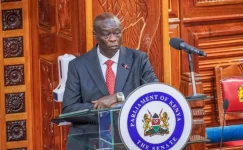Kenya made history recently when its Deputy President, Rigathi Gachagua, was impeached. Gachagua tried very hard to prevent this from happening, going to different courts to file many applications. But in the end, he failed.
The judges were very careful during this time. They did not want to get caught up in the political fight; they wanted to stay neutral. Gachagua's plan to file many court cases could have caused problems. Different judges might have made opposite decisions, which would have made the courts look bad.
Gachagua did get some court orders that let him stay in office for two more weeks. But eventually, those orders were canceled, and he had to leave his position in a shameful way.
Some things happened in court that could have made the judges angry. One of Gachagua's lawyers said something untrue about a judge. The lawyer claimed the judge had been a student of the new Deputy President. This would have been a conflict of interest. But it was not true at all. The judge had studied in a different country. The courts did not argue with the lawyer. They let people on social media prove them wrong.
The Chief Justice put together a team of three judges to hear all of Gachagua's court cases, which helped keep things organized. Gachagua said his constitutional rights were violated and wanted the impeachment stopped. But Parliament's lawyer said Gachagua had a chance to defend himself.
Gachagua was impeached because of corruption and other accusations. He still says he is innocent, but he will have to prove this in court. If he cannot, he will be out of politics forever.
After he lost his cases, Gachagua tried to stop the new Deputy President from being sworn in. He got a court order to do this. But the government asked the judges to cancel that order. They said the Deputy President position should not stay empty. Gachagua argued this would end his political career. Even if he won in court later, he could not get his job back. But the judges dismissed his arguments. They allowed the new Deputy President to be sworn in. Gachagua had no choice but to give up.
The judges were very careful during this time. They did not want to get caught up in the political fight; they wanted to stay neutral. Gachagua's plan to file many court cases could have caused problems. Different judges might have made opposite decisions, which would have made the courts look bad.
Gachagua did get some court orders that let him stay in office for two more weeks. But eventually, those orders were canceled, and he had to leave his position in a shameful way.
Some things happened in court that could have made the judges angry. One of Gachagua's lawyers said something untrue about a judge. The lawyer claimed the judge had been a student of the new Deputy President. This would have been a conflict of interest. But it was not true at all. The judge had studied in a different country. The courts did not argue with the lawyer. They let people on social media prove them wrong.
The Chief Justice put together a team of three judges to hear all of Gachagua's court cases, which helped keep things organized. Gachagua said his constitutional rights were violated and wanted the impeachment stopped. But Parliament's lawyer said Gachagua had a chance to defend himself.
Gachagua was impeached because of corruption and other accusations. He still says he is innocent, but he will have to prove this in court. If he cannot, he will be out of politics forever.
After he lost his cases, Gachagua tried to stop the new Deputy President from being sworn in. He got a court order to do this. But the government asked the judges to cancel that order. They said the Deputy President position should not stay empty. Gachagua argued this would end his political career. Even if he won in court later, he could not get his job back. But the judges dismissed his arguments. They allowed the new Deputy President to be sworn in. Gachagua had no choice but to give up.












